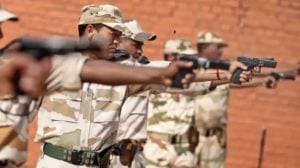Clueless in Bastar
Madhya Pradesh's political leaders will have to do much more than issue strong statements to combat Naxalite violence. After 22 police per...

Madhya Pradesh8217;s political leaders will have to do much more than issue strong statements to combat Naxalite violence. After 22 police personnel were killed in a landmine explosion in Bastar, Home Minister Nand Kumar Patel promised to intensify operations and Chief Minister Digvijay Singh promised new effective legislation to combat the Naxalites. Statements such as these have become obligatory after each incident. They are intended to assuage the feelings of the security forces and assure them and the public that the government knows what has to be done and is determined to do it. However, there is no evidence of a really effective plan to counter the Naxalites. Once the shock of one of the worst death tolls in a decade wears off and with the passage of time, it is likely everything will be forgotten until a new round of explosions and killings makes the politicians queasy again. There has been little change on the ground, for example, after a state minister was killed. In fact, the security forces havebecome even more lax, so much so that they walked straight into a trap. In this latest horrendous incident the Naxalites confirmed that the advantages of tactical planning, subterfuge and reliable information lie almost entirely with them. And as if to prove the hollowness of the politicians8217; promises, they struck again within 24 hours in the village of a police informer.
It is hard to avoid the conclusion that Madhya Pradesh, like other states, has reconciled itself to the fact that the security forces and district administration will go on suffering some attrition every year in the battle with the Naxalites. But Digvijay Singh cannot be unaware of the fact that the toll on the security forces has become unacceptably high especially in Bastar where the largest number of police personnel have been killed in the last decade. The high casualty rate is having an effect on morale. Something will have to be done soon to improve it. The government will also have to regard the Naxalites as more than a law and order issue. New intensive operations can be launched, dalams infiltrated and security force strengths raised. But without a holistic plan that includes accelerated development of backward regions, law and order approaches will only have a limited impact.
Even at the level of law and order it is best not left solely to cells in home departments to deal with the Naxalites. Senior levels need to be involved and more expertise and planning are called for. There has been much talk of a unified command for the security forces of all Naxalite-ridden states but that is yet to come about. Without it, coordination and information-sharing will remain sporadic and of little utility. Digvijay Singh is right to think a coordinated national effort is required to deal with all forms of militancy and violence. However, the Naxalites in contiguous areas of MP, Maharashtra, Andhra Pradesh and Orissa also present a particular kind of challenge. At their own initiative, chief ministers should set up a unified command for anti-Naxalite police units and arrange for specialised training and equipment and communication links.
- 01
- 02
- 03
- 04
- 05































